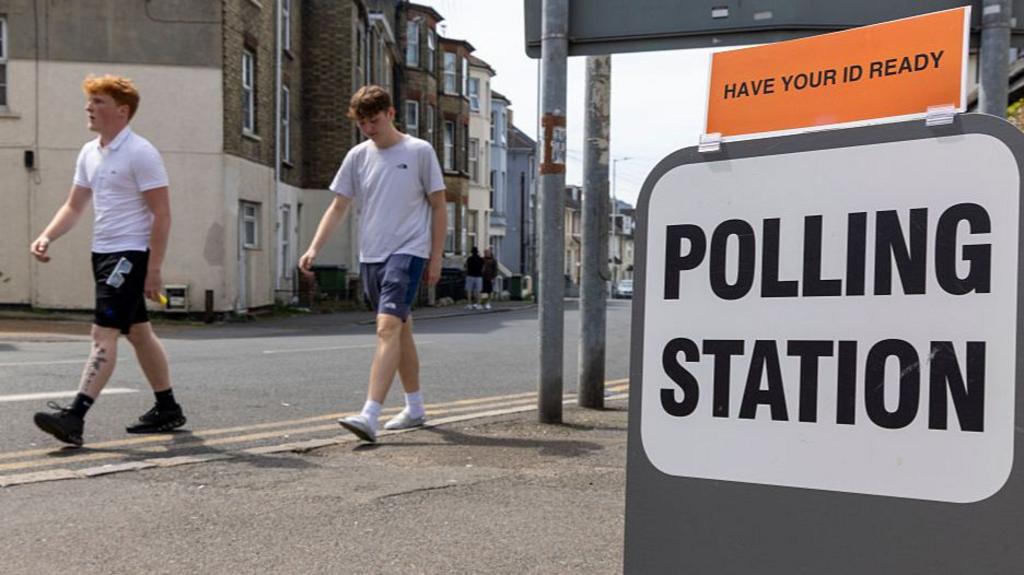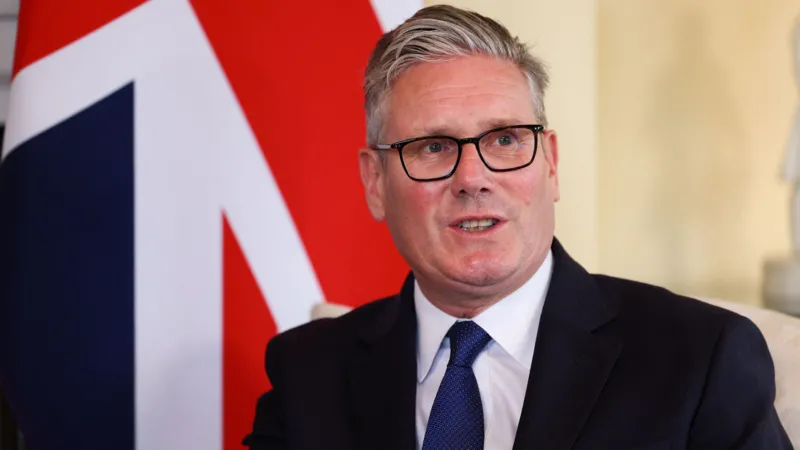Voting age to be lowered for next election - and bank cards accepted as ID
Sixteen and 17-year-olds will be able to vote in the next general election under government plans.

Where do the political parties stand on lowering the voting age?
The government has announced it is going to lower the voting age to 16 for the next general election.
Labour's huge majority in the Commons means this will almost certainly become law, but what do the other parties think of the proposal?
Conservatives
Tory shadow minister Paul Holmes said the Tories aren't in favour of lowering the voting age.
He asked why Labour think a "16-year-old can vote but not be allowed to buy a lottery ticket, an alcoholic drink, marry or go to war, or even stand in the elections they're voting in?"
Liberal Democrats
The Lib Dems are in favour of lowering the voting age. In fact, they've been one of the main groups calling for this change for more than two decades and dubbed it a "no-brainer".
But it's not all praise for the government from Sir Ed Davey's party.
Chiefly, they'd like proportional representation in general elections, too - which the government ruled out without missing a beat.
Reform UK
Nigel Farage's party is strongly against lowering the voting age, despite becoming the most popular UK political party on TikTok.
There have been several reports of the party's growing support among younger boys and men (watch below).
But deputy leader Richard Tice made very clear in the Commons that Reform "are very much against votes for 16 and 17-year-olds".
SNP
The SNP called Labour's plans a "long-overdue change".
It's not a surprise, seeing as the SNP lowered the voting age to 16 in Scotland a decade ago for devolved and local elections.
Pete Wishart MP observed: "It is good to see the UK government finally following the SNP government's lead."
Green Party
The Greens are all in favour, too.
Ellie Chowns MP said "Labour have got it right" and called it a "long-overdue step towards a stronger, more inclusive democracy".
But like the Lib Dems, they also want the government to introduce a proportional representation electoral system.
Starmer evokes Michael Gove's 'tired of experts' line
During a conference speech earlier, Sir Keir Starmer touched on immigration, saying politicians have often chosen to "stoke division instead of bringing people together to fix the problem".
He insists the government is working to build "stronger communities, a fairer system, a better society for everyone" - despite the number of small boat crossings increasing over the past year.
A Brexit throwback
At the heart of tackling the immigration issue is "rebalancing power and responsibility", he says.
Harking to the Brexit divisions of the past, he says: "When the Tories said that people were 'tired of experts', let me tell you what I think people are tired of.
"I think they're tired of establishment figures who don't listen to them, who don't understand the challenges that they face.
"Tired of being excluded from decisions about their own lives, tired of being treated like their experiences don't matter. And they're the people this government is working for."
Starmer says young people should be able to vote because they're old enough to 'pay in'
The prime minister has explained he is lowering the voting age to 16 because by then people are "old enough to go out to work" and pay taxes.
"And I think if you pay in, you should have the opportunity to say what you want your money spent on, which way the government should go."
He told ITV News he's "really pleased" to bring democracy to "more young people" and give them a "chance to have a say over how their taxes are paid and what they're going to be used for".
Reform reject plan to lower voting age
Reform UK is against votes for 16 and 17-year-olds, Richard Tice says.
The deputy leader welcomes many of the government's reforms, particularly around the safety of candidates, but he says Reform are "very much against votes for 16 and 17-year-olds".
Instead, Tice says Reform have "grave concerns" about postal voting, something that Donald Trump has previously criticised in the US.
Implausibly and without evidence, he claims: "I myself have seen people carry bag loads of postal votes to a polling station on election day. That is surely completely wrong."
Fellow MPs seem sceptical…
Minister Rushanara Ali tells Tice that if he has examples of this, then he should "report it to the police".
She's not the only MP sceptical about Tice's claim.
Conservative MP Nursrat Ghani stands up and reminds MPs that they must be "accurate in our statements", asking Tice "for clarity".
Since 2022, people cannot be issued with more than six postal votes covering themselves and others in total.
She asks, rhetorically: "Would the honourable member for Boston and Skegness [Tice] want to reflect on that statement of people carrying multiple bags of postal votes?"
MPs call for political crypto donations to be banned
MPs have urged the government to ban the use of donations via cryptocurrencies to safeguard UK democracy.
Labour MP Liam Byrne says: "They are used for money laundering. They are used to disguise dark money. They have no role in British politics. Would you confirm the elections bill will ban cryptocurrency donations?"
Rushanara Ali responds, saying that there are "already a number of rules in place on political donations… including for cryptocurrency".
The minister adds: "Our reforms on political finance to further strengthen our democracy will apply to all donations, regardless of form, and that includes cryptocurrency."
But another Labour MP now pops up to ask about cryptocurrency again.
Matt Weston says he is "gently" asking the minister to look at cryptocurrencies, as they are "clearly the choice of currency of choice for criminals and rogue states".
He claims that "one individual has routed £13m into political organisations in this country through such currency."
Ali responds that he is right to be "concerned about new challenges in relation to crypto" and refers him to her previous answer.
PM opens conference with new slogan
Sir Keir Starmer is now delivering his speech at the government's civil society summit.
On the podium appears to be a new slogan: not the often repeated "Plan for Change", but "Delivering Change Together".
It might not seem like a big difference - but in the context of the prime minister suspending four of his MPs for rebelling over the welfare bill, could he be sending a message about party unity?
Lib Dems say government's plans to reform elections lack 'ambition'
The Liberal Democrats have welcomed the government's proposals to lower the voting age and tighten checks on foreign donations.
Sarah Olney says "there are many aspects" of the reforms that the Lib Dems will support, having long championed votes at 16.
She continues: "We also welcome the measures to tackle dark and illicit money in our politics, and also the recent plans to introduce supplement supplementary voting for mayoral elections."
But she says she is "concerned" the strategy "shows nowhere near the kind of ambition that we need".
Olney adds: "Last year's general election turned out the most disproportionate result in history, with nearly 60% of people who voted not represented in parliament by the candidate that they voted for.
"This opportunity cannot be wasted."
The Musk effect
She calls on the government to go further and look at other measures "to ensure that foreign oligarchs such as Elon Musk are not able to interfere in British politics, including through party funding?"
He has previously been mooted as a potential Reform donor.
Tories accuse Labour of having a 'hopelessly confused' position on young people
The Conservatives have criticised measures to allow 16 and 17-year-olds to vote in general elections.
Paul Holmes asks: "Why does this government think a 16-year-old can vote but not be allowed to buy a lottery ticket, an alcoholic drink, marry or go to war, or even stand in the elections they're voting in?
"Isn't the government's position on the age of majority just hopelessly confused?"
The shadow housing, communities and local government minister also queries whether "allowing bank account cards [will] undermine the security of the ballot box"?
He also criticises Labour for not consulting other parties on the changes.
No apologies here!
Responding, Rushanara Ali says she makes "no apologies for finally taking the tough choices to protect Britain's democracy from malign foreign interference".
The minister also hits back that the Conservatives were in power for 14 years and "did nothing to close the gaping loopholes allowing foreign interference and foreign money to enter our system".
She concludes her response by saying that the government would like to "get as much cross-party agreement as possible".
Starmer to address first ever Civil Society Summit
Away from the voting changes which have just been announced, the prime minister is beginning his address to the Civil Society Summit, a conference organised by the government for the first time.
Sir Keir Starmer has brought charities, experts, and communities together as he pledges to "put people at the heart of government".
Minister says election reforms will 'protect and strengthen' democracy
Rushanara Ali says the government's plans to lower the voting age to 16, and tighten rules around foreign donations, will "protect and strengthen" the UK's democracy.
The housing, communities and local government minister has given a short speech in the Commons to announce the measures, after the Tories summoned her to do so.
She warns that "there is a growing and worrying trend of candidates, administrators, and electors who face harassment and intimidation", and says the government's measures to increase sentences for abuse should reverse this trend.
"We will be fixing the foundations of how elections operate, taking forward a range of practical measures to ensure elections continue to be delivered successfully," she adds.
Where can 16 and 17-year-olds currently vote in the UK?
Sixteen and 17-year-olds will be able to vote at the next general election.
The voting age for general elections last changed more than half a century ago - in 1969, when the voting age was lowered from 21 to 18.
But for many young people, it won't be their first time voting.
Scotland gave young people the right to vote in devolved elections for the first time nine years ago, in 2016.
Wales followed suit in 2020.
In England, 16 and 17-year-olds can't vote in local or national elections.
In their announcement that younger voters will be given the vote, ministers specifically stated this was in part to bring England and Northern Ireland in line with 16 and 17-year-olds in Scotland and Wales.
But it will be the first time that young people from any of the four nations making up the UK will be able to vote in a general election.
Bank cards to be accepted as voter ID under new proposals
Bank cards and digital versions of driving licences will become acceptable forms of voter ID under new rules being put forward by the government.
As well as lowering the voting age so that 16 and 17-year-olds will be able to vote in the next general election, ministers have also announced a number of measures to make casting a ballot more accessible.
The new rules will also crack down on foreign influence in UK elections.
Under the proposals:
- UK-issued bank cards will become acceptable forms of voter ID
- Digital versions of the Veteran Card and the UK driving licence will be able to be used as voter ID (when digital versions become available)
- A new digital Voter Authority Certificate will be created
- Registering to vote will become easier with an increasingly automated voter registration system
- Loopholes allowing foreign donors to donate to UK political parties via 'shell companies' will be closed
- New checks will be introduced on donations of more than £500 from unincorporated associations to tackle foreign interference
The Electoral Commission will be able to enforce larger fines of up to £500,000 on those who breach political finance rules, and will be able to use tougher sentences on those who abuse election campaigners
16 and 17-year-olds will be able to vote in next general election
Sixteen and 17-year-olds will be able to vote in a general election for the first time, under plans unveiled today.
The government is proposing to lower the voting age from 18 to 16 in time for the next general election.
The move was a key pledge in Labour's manifesto, and will see 16 and 17-year-olds able to vote in all UK elections.
Currently, 16 and 17-year-olds can vote in devolved elections in Scotland and Wales.
The government says this would be the "biggest change to UK democracy in a generation".
The last time the voting age was lowered (from 21 to 18) was in 1969.
Angela Rayner said: "We are taking action to break down barriers to participation that will ensure more people have the opportunity to engage in UK democracy."
-SKY NEWS






